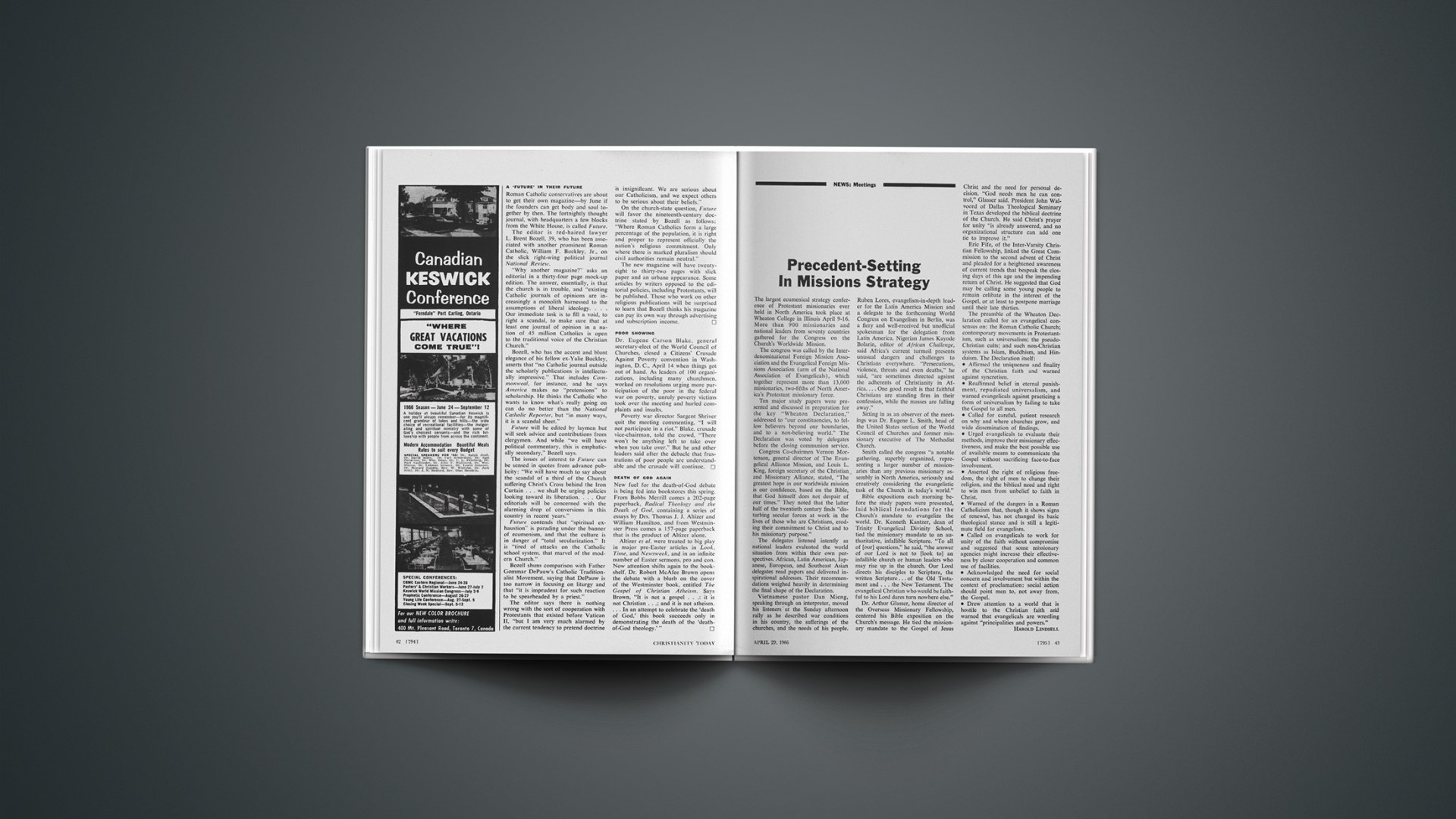The largest ecumenical strategy conference of Protestant missionaries ever held in North America took place at Wheaton College in Illinois April 9–16. More than 900 missionaries and national leaders from seventy countries gathered for the Congress on the Church’s Worldwide Mission.
The congress was called by the Interdenominational Foreign Mission Association and the Evangelical Foreign Missions Association (arm of the National Association of Evangelicals), which together represent more than 13,000 missionaries, two-fifths of North America’s Protestant missionary force.
Ten major study papers were presented and discussed in preparation for the key “Wheaton Declaration,” addressed to “our constituencies, to fellow believers beyond our boundaries, and to a non-believing world.” The Declaration was voted by delegates before the closing communion service.
Congress Co-chairmen Vernon Mortenson, general director of The Evangelical Alliance Mission, and Louis L. King, foreign secretary of the Christian and Missionary Alliance, stated, “The greatest hope in our worldwide mission is our confidence, based on the Bible, that God himself does not despair of our times.” They noted that the latter half of the twentieth century finds “disturbing secular forces at work in the lives of those who are Christians, eroding their commitment to Christ and to his missionary purpose.”
The delegates listened intently as national leaders evaluated the world situation from within their own perspectives. African, Latin American, Japanese, European, and Southeast Asian delegates read papers and delivered inspirational addresses. Their recommendations weighed heavily in determining the final shape of the Declaration.
Vietnamese pastor Dan Mieng, speaking through an interpreter, moved his listeners at the Sunday afternoon rally as he described war conditions in his country, the sufferings of the churches, and the needs of his people.
Ruben Lores, evangelism-in-depth leader for the Latin America Mission and a delegate to the forthcoming World Congress on Evangelism in Berlin, was a fiery and well-received but unofficial spokesman for the delegation from Latin America. Nigerian James Kayode Bolarin, editor of African Challenge, said Africa’s current turmoil presents unusual dangers and challenges to Christians everywhere. “Persecutions, violence, threats and even deaths,” he said, “are sometimes directed against the adherents of Christianity in Africa.… One good result is that faithful Christians are standing firm in their confession, while the masses are falling away.”
Sitting in as an observer of the meetings was Dr. Eugene L. Smith, head of the United States section of the World Council of Churches and former missionary executive of The Methodist Church.
Smith called the congress “a notable gathering, superbly organized, representing a larger number of missionaries than any previous missionary assembly in North America, seriously and creatively considering the evangelistic task of the Church in today’s world.”
Bible expositions each morning before the study papers were presented, laid biblical foundations for the Church’s mandate to evangelize the world. Dr. Kenneth Kantzer, dean of Trinity Evangelical Divinity School, tied the missionary mandate to an authoritative, infallible Scripture. “To all of [our] questions,” he said, “the answer of our Lord is not to [look to] an infallible church or human leaders who may rise up in the church. Our Lord directs his disciples to Scripture, the written Scripture … of the Old Testament and … the New Testament. The evangelical Christian who would be faithful to his Lord dares turn nowhere else.”
Dr. Arthur Glasser, home director of the Overseas Missionary Fellowship, centered his Bible exposition on the Church’s message. He tied the missionary mandate to the Gospel of Jesus Christ and the need for personal decision. “God needs men he can control,” Glasser said. President John Walvoord of Dallas Theological Seminary in Texas developed the biblical doctrine of the Church. He said Christ’s prayer for unity “is already answered, and no organizational structure can add one tie to improve it.”
Eric Fife, of the Inter-Varsity Christian Fellowship, linked the Great Commission to the second advent of Christ and pleaded for a heightened awareness of current trends that bespeak the closing days of this age and the impending return of Christ. He suggested that God may be calling some young people to remain celibate in the interest of the Gospel, or at least to postpone marriage until their late thirties.
The preamble of the Wheaton Declaration called for an evangelical consensus on: the Roman Catholic Church; contemporary movements in Protestantism, such as universalism; the pseudo-Christian cults; and such non-Christian systems as Islam, Buddhism, and Hinduism. The Declaration itself:
• Affirmed the uniqueness and finality of the Christian faith and warned against syncretism.
• Reaffirmed belief in eternal punishment, repudiated universalism, and warned evangelicals against practicing a form of universalism by failing to take the Gospel to all men.
• Called for careful, patient researeh on why and where churches grow, and wide dissemination of findings.
• Urged evangelicals to evaluate their methods, improve their missionary effectiveness, and make the best possible use of available means to communicate the Gospel without sacrificing face-to-face involvement.
• Asserted the right of religious freedom, the right of men to change their religion, and the biblical need and right to win men from unbelief to faith in Christ.
• Warned of the dangers in a Roman Catholicism that, though it shows signs of renewal, has not changed its basic theological stance and is still a legitimate field for evangelism.
• Called on evangelicals to work for unity of the faith without compromise and suggested that some missionary agencies might increase their effectiveness by closer cooperation and common use of facilities.
• Acknowledged the need for social concern and involvement but within the context of proclamation: social action should point men to, not away from, the Gospel.
• Drew attention to a world that is hostile to the Christian faith and warned that evangelicals are wrestling against “principalities and powers.”










